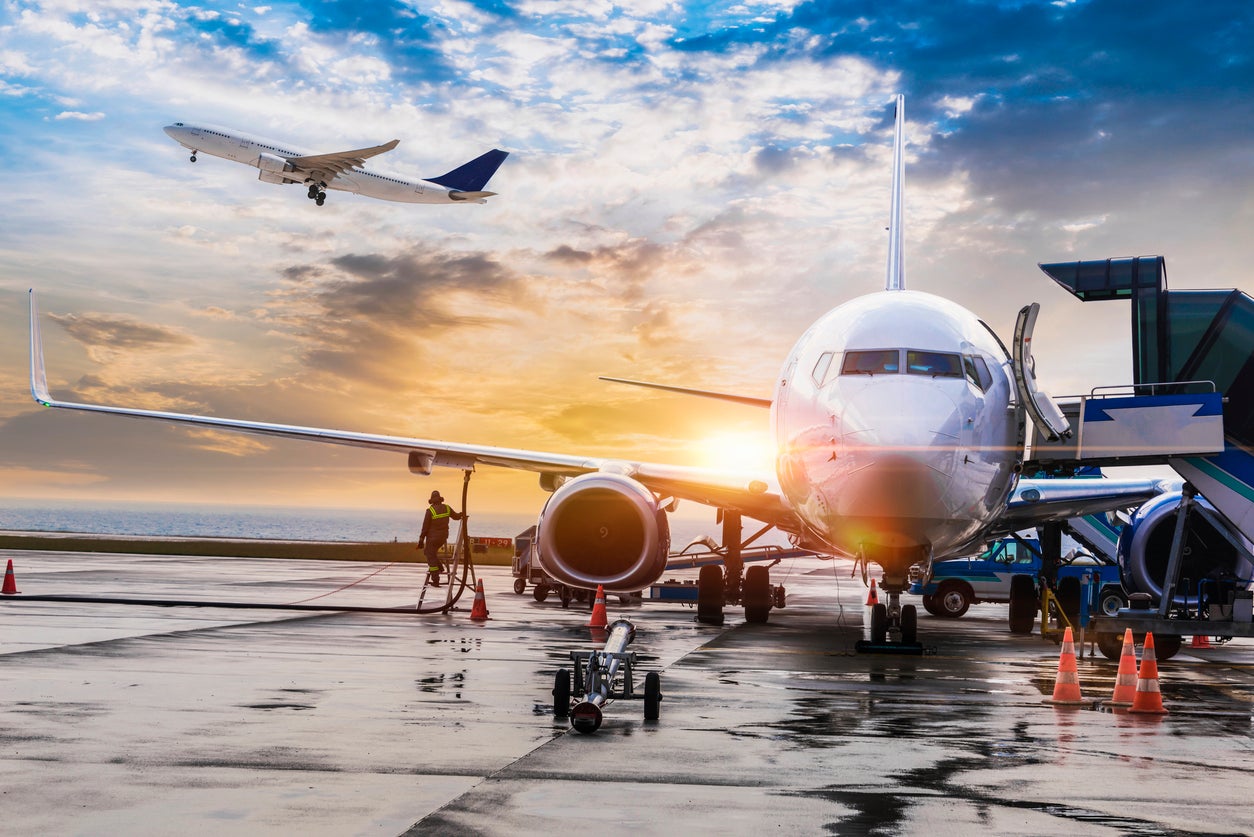No masks, higher fares: How US air travel will change in a post-pandemic world
As Covid recedes, air travelers are likely to face higher ticket prices, expensive perks, and fewer flights to small destinations – but they can take their masks off. Nathan Place writes

Your support helps us to tell the story
From reproductive rights to climate change to Big Tech, The Independent is on the ground when the story is developing. Whether it's investigating the financials of Elon Musk's pro-Trump PAC or producing our latest documentary, 'The A Word', which shines a light on the American women fighting for reproductive rights, we know how important it is to parse out the facts from the messaging.
At such a critical moment in US history, we need reporters on the ground. Your donation allows us to keep sending journalists to speak to both sides of the story.
The Independent is trusted by Americans across the entire political spectrum. And unlike many other quality news outlets, we choose not to lock Americans out of our reporting and analysis with paywalls. We believe quality journalism should be available to everyone, paid for by those who can afford it.
Your support makes all the difference.Every business has been affected by the pandemic, but few industries have been as thoroughly disrupted as air travel. As Covid-19 has waxed and waned, airlines have suffered thousands of canceled flights, plummeting ticket prices, and a federal mask mandate that catalyzed a wave of violent incidents on planes.
Now, as the virus appears to be receding – at least for the moment – air travel may be entering a new phase once again. What can customers expect?
To answer this question, The Independent spoke with Dr Sheldon Jacobson, a computer science professor at the University of Illinois and an award-winning expert on airport security. Dr Jacobson sees a wide range of changes ahead.
No more masks
The most visible change coming up, the professor said, is that masks will no longer be required on planes.
“At some point the mask mandate will completely go away,” he said.
Last week, the Centers for Disease Control and Prevention (CDC) announced that the federal mask mandate on public transportation would be extended through 18 April. During that time, however, the CDC and other agencies plan to “revise” the policy.
Whether that will mean dropping the mandate altogether remains to be seen. But judging by both the announcement and the extremely low infection rates throughout the country in recent weeks, Dr Jacobson thinks the end is near.
“We’ve got a month now to work things out,” he said. “It’s very possible that some of the airlines will mandate it individually… Or they may mandate it on certain routes, based on the risk associated with them. All these things are on the table right now.”
Higher ticket prices
One rare benefit of the pandemic has been unusually low airfares. Dr Jacobson thinks that’s about to change.
“We’ve been in a buyer’s market for airplane tickets for the last two years,” the professor said. “It’s amazing how inexpensive air travel became. That can’t continue because the airlines can’t stay solvent with that.”
As the coronavirus subsides, it’s scaring fewer people away from getting on a plane. And as demand for flights goes up, so will prices.
“When it becomes a seller’s market, there will be a handful of seats on each flight… that are low cost, and they’ll advertise them,” Dr Jacobson said. “But once they’re taken, you’re going to see fares go much, much higher.”
A new definition of ‘frequent flyer’
Another change Dr Jacobson predicted is more complex, and has been underway throughout the pandemic. As frequent flyers became less frequent, airlines needed a new way to gauge their best customers. The answer, they decided, was simple:
“A frequent flyer isn’t necessarily someone who flies a lot; it’s someone who spends a lot,” Dr Jacobson said.
From the airlines’ perspective, the phrase means a customer who’s earned “elite status.” These passengers are showered with perks, like boarding early or checking luggage for free. Until recently, business travelers typically earned this status by – literally – frequently flying. The pandemic changed all that.
“Business travelers have been sitting at home doing everything virtually, and they’re losing their elite status,” Dr Jacobson said. “The airlines understood this in the last two years, and they gave them back doors to get their elite status.”
To open those doors, customers will have to pay.
Fewer flights to small destinations
This evolution of “elite” customers is leading to another change, Dr Jacobson said: fewer flights to less popular destinations. Hubs like New York and Los Angeles will always have plenty of flights. But smaller and more rural locations are likely to suffer.
“What you’re going to really have is, in some sense, a widening of the gap between the high-value passengers and the low-value passengers,” Dr Jacobson said. “The airlines are also going to rethink their schedules very carefully, because the thought is, well, if we have more travelers, we’re going to have more flights, but if it’s the wrong value passengers, they’re not getting much revenue benefit from that.”
The result, he said, is fewer planes flying into lesser-known airports.
“Some of the smaller markets, you’re gonna see fewer options and fewer choices. This is all kind of the evolution,” Dr Jacobson said. “They’re gonna focus their attention on where they make the most revenue.”




Join our commenting forum
Join thought-provoking conversations, follow other Independent readers and see their replies
Comments